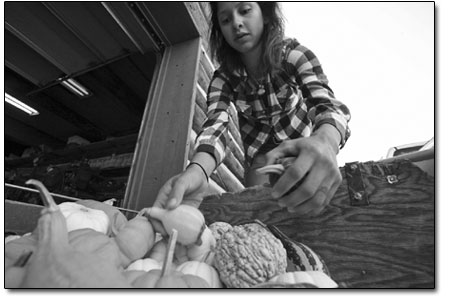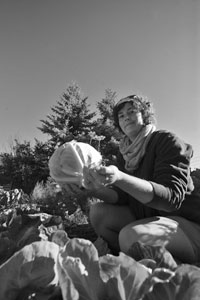|
| ||||
| The backyard harvest SideStory: The urban agriculture experiment
by Will Sands
When First Lady Eleanor Roosevelt sank a vegetable garden into the White House lawn in 1943, she kicked off the “Victory Garden” movement. The idea was to inspire self-sufficiency during the lean years of World War II, and America picked up its spade and responded. At their peak, Victory Gardens supplied 40 percent of America’s fresh produce. Brooke Frazer and Kasi Schnell were channeling Roosevelt when they started Your Backyard Harvest in Durango more than a year ago. The pair founded the business with the idea of pushing La Plata County closer to self-sufficiency by replacing lawns, flowerbeds and vacant lots with vegetable gardens. “Our idea was to create organic, edible landscapes in people’s yards. The original goal was to get more people to incorporate food and farming into their lives,” Frazer explained. “Now we’re trying to take this to the next level and use people’s back yards as a major source of food production.” Frazer and Schnell are currently seeking plots inside Durango city limits and offering locals an easy path to food production. They will take your lawn or vacant lot and convert it into an organic vegetable garden this fall; set up a drip irrigation system and get seeds in the ground next spring; handle all of the maintenance and upkeep; bring in the harvest; and put the plot to bed for the winter. In exchange for use of the land, Your Backyard Harvest will give property owners part of the harvest and supply them with fresh vegetables throughout the season. As an added bonus, Frazer and Schnell use their bicycles for transporting tools and materials through town and use local and reclaimed materials whenever possible. “The hope is that we can take local to a new level,” Frazer said. “People will have access to food that is grown 2 to 3 miles from where it is grown. At the same time, Durango will be improving soil heath, increasing biodiversity and enhancing the ecosystem.”
Frazer and Schnell are kicking off the push for a not entirely selfless reason – they want to be farmers. High land costs around Durango and La Plata County are a big part of what drove the pair to found4 Your Backyard Harvest. By setting up a network of microfarms, Frazer and Schnell hope to live their agrarian dreams. “Owning a farm has always been my dream,” Frazer said. “But like most of us, I’ve never had the means to buy land around Durango.” Kipp Nash, the originator of the multiplot farm approach in Colorado, fell into the movement for the same reason. In 2005, he moved to Boulder with visions of fresh produce dancing in his head. Like Frazer, he was immediately stymied by the cost of land. “I’d developed a strong interest in organic agriculture, local foods and living simply, and I was trying to become a farmer,” Nash said. “But the price of land in Boulder County was astronomical, and owning a farm was out of the question. One day, the idea just popped into my head that if we piece together a number of backyards, we would have the acreage we needed and could start feeding some people.” In the last five years, Nash’s Community Roots has successfully converted 13 front and back yards, and church lawns into vegetable gardens. In Community Roots’ best year it moved $30,000 worth of produce and put everything from arugala to Zapotec tomatoes on Boulder tables. “When you get smaller and work more intensively, you become a more efficient grower and your proceeds bloom,” Nash noted. “Even though I was a beginning farmer, I was able to creat quite a stir, get Community Roots off the ground and create some pretty sweeping change.” Though he has watched similar movements pop up in Denver, Buena Vista, Fort Collins and now Durango, five years of digging in Boulder’s backyards was enough for Nash. He and his family will transition into a new chapter following this year’s harvest. “It’s definitely been a labor of love,” Nash said. “I feel like I’ve played an important part in the movement, and it feels right to be passing it on. I’m glad that Durango is picking it up.” For their part, Frazer and Schnell hope to carry on the multi-plot approach for many years in Southwest Colorado. They are also hopeful that Durango will embrace this new approach to localizing agriculture. “Growing food in your front or back yard is a huge community benefit,” Frazer said. “We’re hoping we can rejuvenate unused land, get good food into the local stream and bring a little more life into downtown Durango.” Your Backyard Harvest is currently seeking yards that are more than 1,000 square feet in size and located inside Durango city limits. The plots must be chemical-free; receive at least six hours of sunlight; and be free of large trees and roots. Property owners will be given a portion of next summer’s harvest in exchange. For more information, contact Brooke Frazer at 403-6534.
|
In this week's issue...
- December 18, 2025
- Let it snow
Although ski areas across the West have taken a hit, there’s still hope
- December 18, 2025
- Look, but don't take
Lessons in pottery theft – and remorse – from SW Colorado
- December 11, 2025
- Big plans
Whole Foods, 270 apartments could be coming to Durango Mall parcel



 Durango could be feasting on its own back yard in coming years. A local business is hoping to jumpstart urban agriculture in Durango with an innovative microfarm approach.
Durango could be feasting on its own back yard in coming years. A local business is hoping to jumpstart urban agriculture in Durango with an innovative microfarm approach.